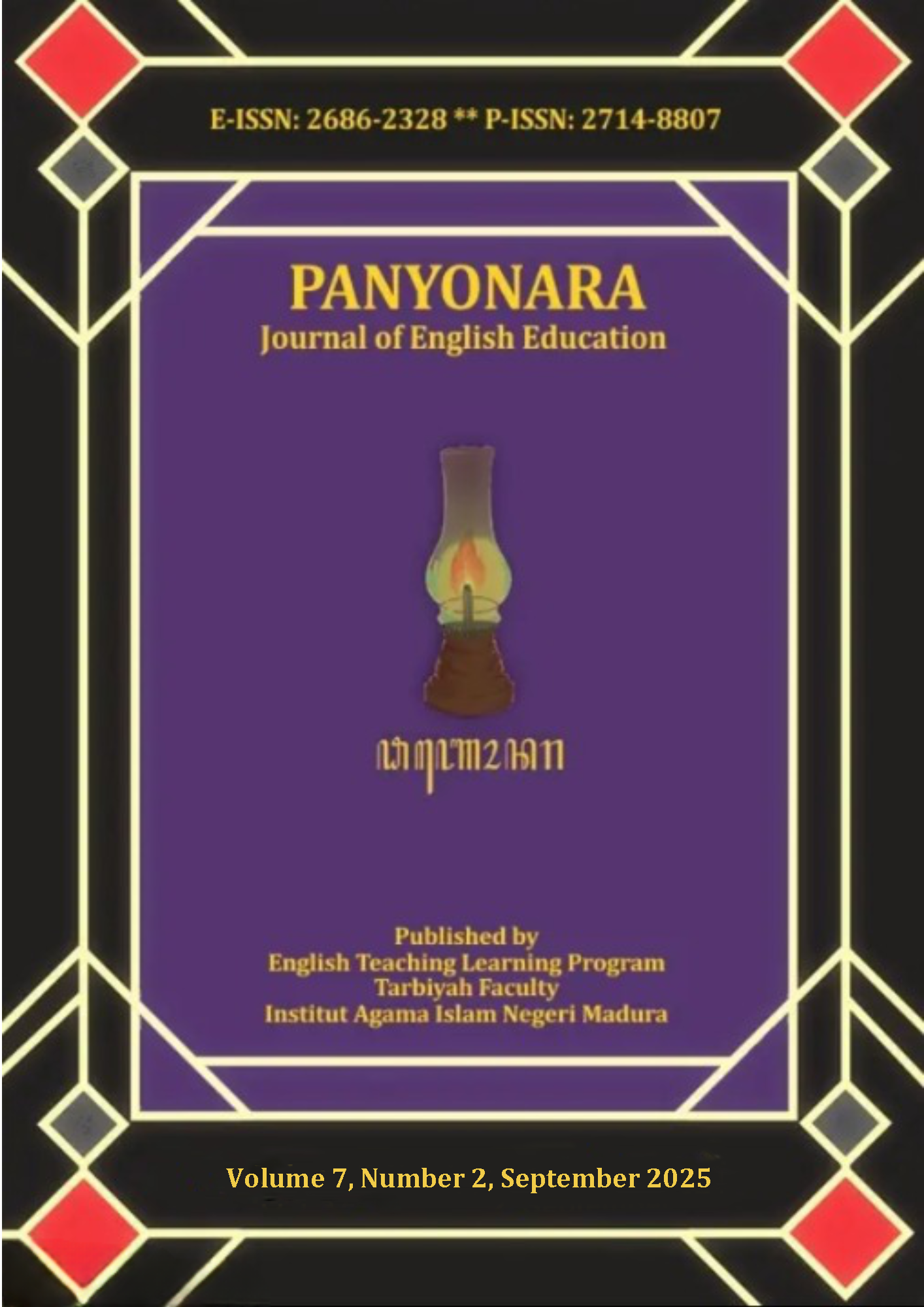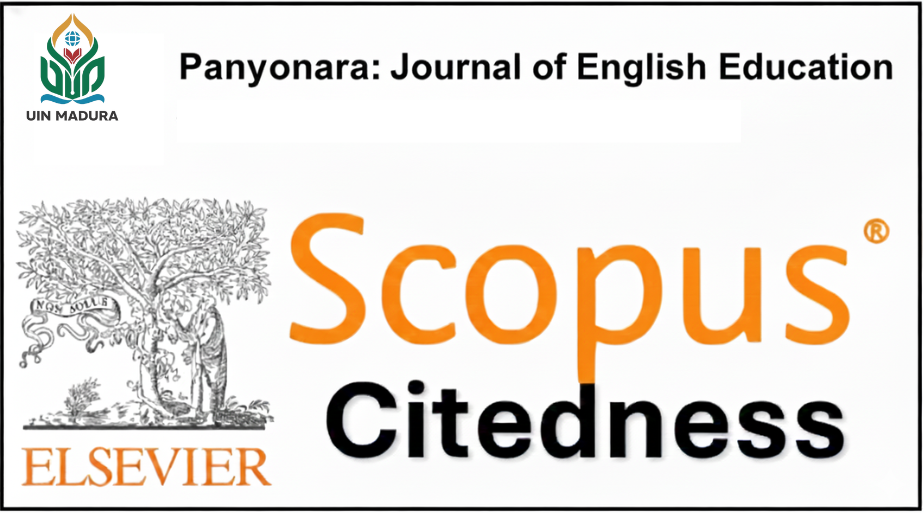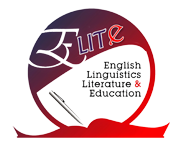EFL Students’ Engagement on the Lecturer’s Global Comments as Written Corrective Feedback in Undergraduate Thesis Coursework
 Abstract views: 189
,
Abstract views: 189
,
 PDF downloads: 148
PDF downloads: 148
Abstract
Although there have been studies discussing written corrective feedback, there are still limited studies exploring how students engage with the written corrective feedback (WCF), especially the lecturer's global comments as WCF in the context of the EFL undergraduate thesis writing process. This interview study discusses students' engagement with the lecturer's global comments as written corrective feedback. Four students participating in undergraduate thesis coursework agreed to participate in this study. Data were mainly collected through interviews. The study indicates that the students demonstrated affective engagement, like becoming more patient and satisfied with their drafts, confident with their writing, and responsible with their tasks. They also demonstrated behavioural engagement, such as responding to feedback regularly and becoming more consistent with the content. They also show cognitive engagement, such as being more attentive, detailed, and focused in the coherence of citations and references with background, research questions, and methodology, and grammatical accuracy, based on the lecturer's feedback on the process of writing an undergraduate thesis. However, the findings in this study are still limited to identifying the types of engagement from the lecturer's global comments as WCF. Future research may include more deliberative discussion on localised comments and surface versus deep-level awareness of WCF.
Downloads
References
Almanea, M. (2025). Less Is Not More for Learners: EFL Learners’ Preferences and Perceptions of Teachers’ Written Corrective Feedback. Acta Psychologica, 255, 104926. https://doi.org/10.1016/j.actpsy.2025.104926
Almohawes, M. (2025). Undergraduate EFL Learners’ Preferences for Three Different Types of Written Corrective Feedback. Frontiers in Education, 10. https://doi.org/10.3389/feduc.2025.1532729
Bitchener, J., & Storch, N. (2016). Written Corrective Feedback for L2 Development. Multilingual Matters. Writing & Pedagogy 9(3), 555–558 https://doi.org/10.21832/9781783095056
Cao, Z., Yu, S., & Huang, J. (2019). A Qualitative Inquiry into Undergraduates’ Learning from Giving and Receiving Peer Feedback in L2 Writing: Insights from a Case Study. Studies in Educational Evaluation, 63(July), 102–112. https://doi.org/10.1016/j.stueduc.2019.08.001
Castillo-Montoya, M. (2016). Preparing for Interview Research: The Interview Protocol Refinement Framework. The Qualitative Report, 21(5), 811–831. http://nsuworks.nova.edu/tqr/vol21/iss5/2.
Cheng, A. (2006). Understanding Learners and Learning in ESP Genre-Based Writing Instruction. English for Specific Purposes, 25(1), 76–89. https://doi.org/10.1016/j.esp.2005.07.002
Ellis, R. (2010). Epilogue: A Framework for Investigating Oral and Written Corrective Feedback. Studies in Second Language Acquisition, 32(2), 335–349.
Febrian, R. A., & Nurcholis, I. A. (2025). The Efficacy of Written Corrective Feedback in Improving English as a Foreign Language University Students’ Writing. Jurnal Review Pendidikan dan Pengajaran, 8(1), 2931–2939. https://doi.org/10.31004/jrpp.v8i1.43109
Fredricks, J. A., Blumenfeld, P. C., & Paris, A. H. (2004). School Engagement: Potential of the Concept, State of the Evidence. Review of Educational Research, 74(1), 59–109. https://doi.org/10.3102/00346543074001059
Gu, J., & Aslan, E. (2025). Exploring EFL Teachers’ Beliefs and Practices about Written Feedback Strategy, Scope, and Focus. Journal of Response to Writing: 11(1), 1–41. https://scholarsarchive.byu.edu/journalrw/vol11/iss1/1
Han, Y. (2019). Written Corrective Feedback From an Ecological Perspective: The Interaction Between the Context and Individual Learners. System, 80, 288–303. https://doi.org/10.1016/j.system.2018.12.009
Han, Y., & Hyland, F. (2015). Exploring Learner Engagement with Written Corrective Feedback in a Chinese Tertiary EFL Classroom. Journal of Second Language Writing, 30, 31–44. https://doi.org/10.1016/j.jslw.2015.08.002
Hyland, F. (1998). The Impact of Teacher Written Feedback on Individual Writers. Journal of Second Language Writing, 7(3), 255–286. https://doi.org/10.1016/S1060-3743(98)90017-0
Hyland, K., & Hyland, F. (2006). Feedback on Second Language Students’ Writing. Language Teaching, 39(2), 83–101. https://doi.org/10.1017/S0261444806003399
Kvale, S., & Brinkmann, S. (2009). Interviews: Learning the Craft of Qualitative Research Interviewing. (Second Ed.). London: Sage.
Lee, I. (2019). Teacher Written Corrective Feedback: Less Is More. Language Teaching, 52(4), 524–536. https://doi.org/10.1017/S0261444819000247
Lim, S., & Renandya, W. (2020). Efficacy of Written Corrective Feedback in Writing Instruction: A Meta-Analysis. The Electronic Journal for English as a Second Language, 24(3), 1–26.
Lincoln, Y. S., Guba, E. G., & Pilotta, J. J. (1985). Naturalistic Inquiry. International Journal of Intercultural Relations, 9(4), 438–439. https://doi.org/10.1016/0147-1767(85)90062-8
Liu, K., & Storch, N. (2023). Second Language Learners’ Engagement With Written Feedback. Australian Review of Applied Linguistics, 46(1), 4–28. https://doi.org/10.1075/aral.20029.liu
Long, M. . (1996). The Role of the Linguistic Environment in Second Language Acquisition. In W. R. & T. K. Bhatia (Ed.), Handbook of second language acquisition (pp. 413–468). Academic Press.
Mao, Z., & Lee, I. (2022). Researching L2 Student Engagement With Written Feedback: Insights From Socio-cultural Theory. TESOL Quarterly, 56(2), 788–798. https://doi.org/10.1002/tesq.3071
Merriam, S., & Tisdell, E. (2016). Qualitative Research: A Guide to Design and Implementation. John Wiley & Sons, Inc.
Paltridge, B., & Starfield, S. (2020). Change and Continuity in Thesis and Dissertation Writing: The Evolution of an Academic Genre. Journal of English for Academic Purposes, 48, 100910. https://doi.org/10.1016/j.jeap.2020.100910
Park, J.-H., & Ahn, S. (2022). L2 Learners’ Cognitive and Behavioral Engagement with Written Corrective Feedback. English Teaching, 77(3), 133–152. https://doi.org/10.15858/engtea.77.3.202209.133
Rahmadhani, Z., & Hapsari, A. (2023a). Undergraduate Students’ Perception of Lecturers Written Corrective Feedback in the Process of Writing Undergraduate Thesis. ELT Echo: The Journal of English Language Teaching in Foreign Language Context, 8(2), 135. https://doi.org/10.24235/eltecho.v8i2.13399
Rahmadhani, Z., & Hapsari, A. (2023b). Undergraduate Students’ Perception of Lecturers Written Corrective Feedback in the Process of Writing Undergraduate Thesis. ELT Echo: The Journal of English Language Teaching in Foreign Language Context, 8(2), 135. https://doi.org/10.24235/eltecho.v8i2.13399
Rubin, H. J., & Rubin, I. (2012). Qualitative interviewing: The art of hearing data (3rd). London: Sage.
Schmidt, R. W. (1990). The Role of Consciousness in Second Language Learning1. Applied Linguistics, 11(2), 129–158. https://doi.org/10.1093/applin/11.2.129
Storch, N., & Wigglesworth, G. (2010). Learners’ Processing, Uptake, and Retention of Corrective Feedback on Writing. Studies in Second Language Acquisition, 32(2), 303–334. https://doi.org/10.1017/S0272263109990532
Swain, M. (1991). French Immersion and Its Offshoots: Getting Two for One. In B. Freed (Ed.), Foreign language acquisition: Research and the classroom (pp. 91–103).
Tardy, C. M. (2006). Researching First and Second Language Genre Learning: A Comparative Review and a Look Ahead. Journal of Second Language Writing, 15(2), 79–101. https://doi.org/10.1016/j.jslw.2006.04.003
Tardy, C. M., Sommer-Farias, B., & Gevers, J. (2020). Teaching and Researching Genre Knowledge: Toward an Enhanced Theoretical Framework. Written Communication, 37(3), 287–321. https://doi.org/10.1177/0741088320916554
Wang, S., Ramdani, J. M., Sun, S. (Alice), Bose, P., & Gao, X. (Andy). (2024). Naming Research Participants in Qualitative Language Learning Research: Numbers, Pseudonyms, or Real Names? Journal of Language, Identity & Education, 1–14. https://doi.org/10.1080/15348458.2023.2298737
Xu, M., Huang, C., & You, X. (2016). Reasoning Patterns of Undergraduate Theses in Translation Studies: An Intercultural Rhetoric Study. English for Specific Purposes, 41, 68–81. https://doi.org/10.1016/j.esp.2015.09.002
You, X., & You, X. (2025). Genre Learning from the EAP Class to Undergraduate Research Symposiums. English for Specific Purposes, 77, 86–99. https://doi.org/10.1016/j.esp.2024.10.004
Zhang, Z. (Victor), & Hyland, K. (2018). Student Engagement with Teacher and Automated Feedback on L2 Writing. Assessing Writing, 36, 90–102. https://doi.org/10.1016/j.asw.2018.02.004
Zheng, Y., & Yu, S. (2018). Student Engagement with Teacher Written Corrective Feedback in EFL Writing: A Case Study of Chinese Lower-Proficiency Students. Assessing Writing, 37, 13–24. https://doi.org/10.1016/j.asw.2018.03.001
Zheng, Y., Yu, S., & Liu, Z. (2023). Understanding Individual Differences in Lower-Proficiency Students’ Engagement with Teacher Written Corrective Feedback. Teaching in Higher Education, 28(2), 301–321. https://doi.org/10.1080/13562517.2020.1806225
The journal uses an Open Access policy under a Creative Commons Attribution-NonCommercial 4.0 International License. Authors who publish with this journal agree to the following terms:
- Authors retain copyright and grant the journal right of first publication with the work simultaneously licensed under a Creative Commons Attribution License that allows others to share the work with an acknowledgment of the work's authorship and initial publication in this journal.
- Authors are able to enter into separate, additional contractual arrangements for the non-exclusive distribution of the journal's published version of the work (e.g., post it to an institutional repository or publish it in a book), with an acknowledgment of its initial publication in this journal.
- Authors are permitted and encouraged to post their work online (e.g., in institutional repositories or on their website) prior to and during the submission process, as it can lead to productive exchanges, as well as earlier and greater citation of published work.

















